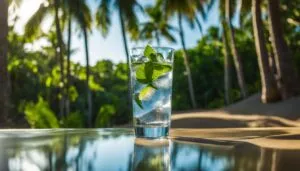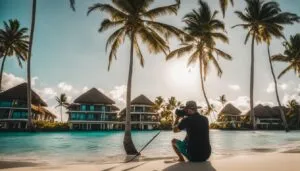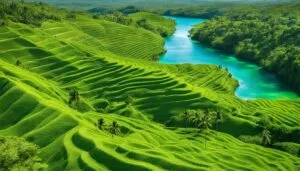Are you looking for a talented and experienced team of wedding photographers in Punta Cana? Look no further! At JJ Studio Photo, we are passionate about capturing moments of love, joy, and happiness on your special day.
With over 15 years of experience working and living in Punta Cana and all over the country, we have honed our skills and developed a keen eye for detail. Our expertise extends beyond wedding photography, as we also specialize in engagement shoots, couple photo sessions, and family sessions.
When you choose us as your wedding photographers, we ensure that every precious moment is beautifully captured, from the exchange of vows to the heartfelt speeches and the lively dance floor. Our goal is to create timeless images that you will cherish for a lifetime.
Visit our website jjstudiophoto.com to view our portfolio and get a glimpse of our talent and style. We pride ourselves on providing exceptional service and personalized attention to every couple we work with, ensuring that your vision and dreams are brought to life through our photographs.
Ready to take the next step? Request a free appointment today by calling us at âï¸+1 849 387 9900.
Key Takeaways:
- Our team of wedding photographers in Punta Cana has over 15 years of experience.
- We specialize in wedding photography, engagement shoots, couple photo sessions, and family sessions.
- Visit our website at jjstudiophoto.com to view our portfolio and learn more about our services.
- Request a free appointment by calling âï¸+1 849 387 9900.
- We are committed to capturing your special day with creativity, passion, and attention to detail.
Water Quality and Safety in Punta Cana
When it comes to tap water in Punta Cana, it’s important to be aware that the water quality can vary. While some areas may have safe tap water, others may pose a higher risk of contamination. To ensure your health and well-being during your trip, it is recommended to follow tap water safety tips:
- Use bottled water for drinking and brushing your teeth.
- Avoid using tap water for cooking or washing food unless it has been properly treated.
- If you prefer to access tap water, consider using water purification methods such as boiling or filtration.
By taking these precautions, you can reduce the risk of waterborne illnesses and enjoy a safer experience in Punta Cana.
Visit our website jjstudiophoto.com to learn more about Punta Cana and request a free appointment for your next trip. You can also reach us at âï¸ +1 849 387 9900.
The Importance of Water Quality
The quality of the water you consume is essential for your health. Poor water quality can lead to various illnesses, including gastrointestinal issues and infections. Understanding the potential risks associated with tap water can help you make informed decisions and protect yourself during your stay in Punta Cana. It’s crucial to prioritize your well-being by following tap water safety measures.
«Water is the driving force of all nature.» – Leonardo da Vinci
Water Quality Comparisons
To illustrate the differences in water quality, below is a comparison table of two hypothetical areas in Punta Cana:
| Area | Water Quality | Recommended Precautions |
|---|---|---|
| Downtown Punta Cana | Highly treated tap water | No additional precautions necessary |
| Rural outskirts | Potential risk of contamination | Use bottled water or treat tap water before consumption |
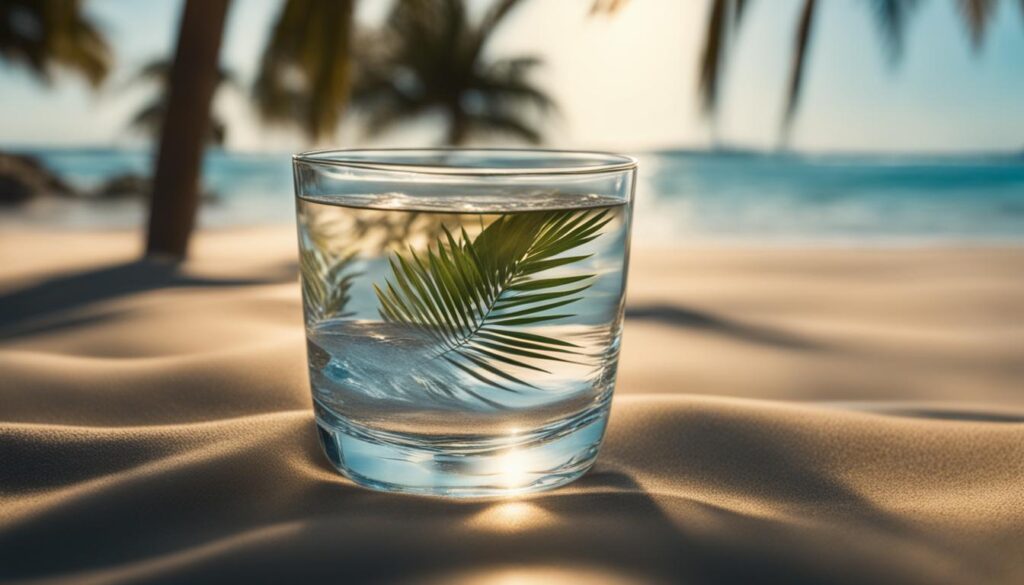
Tips for Safe Tap Water Consumption
Here are some additional tips to ensure the safety of tap water consumption in Punta Cana:
- If bottled water is not readily available, use water purification methods like boiling or filtration.
- Avoid consuming ice cubes or drinks made with tap water unless you are confident in its safety.
- Wash fruits and vegetables with bottled water or properly treated tap water before consumption.
By following these tips, you can minimize the risk of waterborne illnesses and enjoy your time in Punta Cana with peace of mind.
Tap Water vs Bottled Water in Punta Cana
When it comes to accessing drinking water in Punta Cana, you might find yourself choosing between tap water and bottled water. Both options have their advantages and considerations that you should take into account to make an informed decision.
The Case for Bottled Water
Bottled water is a popular choice for many travelers in Punta Cana due to its convenience and perceived safety. Bottled water goes through a purification process, ensuring that it meets quality standards for consumption. By opting for bottled water, you can have peace of mind knowing that you are sipping on water that has been treated and regulated.
«Bottled water goes through a purification process, ensuring that it meets quality standards for consumption.»
Choosing bottled water can also be more convenient when you are on the go. Bottled water is readily available in stores, hotels, and restaurants throughout Punta Cana, making it easily accessible for travelers. With a variety of brands and sizes to choose from, you can find a bottled water option that suits your preferences and hydration needs.
Considering Tap Water
While bottled water is a popular choice, some travelers may prefer to access tap water due to personal preferences or environmental considerations. If you choose to drink tap water in Punta Cana, it is essential to take steps to ensure its safety.
One common method of purifying tap water is boiling. Boiling tap water kills harmful bacteria and parasites that may be present, reducing the risk of waterborne illnesses. Another option is using filtration methods, such as water filters or purifiers, to remove impurities and ensure the water’s safety.
It’s important to note that the safety and quality of tap water can vary depending on the location and infrastructure. Factors such as the water source, treatment processes, and quality control can impact the tap water’s overall safety. Therefore, it is crucial to evaluate these factors before making a decision to consume tap water.
Water Treatment Methods in Punta Cana
When it comes to ensuring the safety of tap water in Punta Cana, there are several effective water treatment methods to consider. Whether you’re a resident or a traveler, it’s important to be aware of these purification techniques that can help eliminate disease-causing organisms and contaminants from your tap water.
Boiling Water
Boiling water is a simple and reliable method that has been used for centuries to make water safe for consumption. By bringing the water to a rolling boil for at least one minute (or three minutes at higher altitudes), you can effectively kill most microorganisms, including bacteria, viruses, and parasites. Boiling is especially useful when dealing with water that may be contaminated with harmful pathogens.
Chemical Disinfection
Chemical disinfectants, such as chlorine bleach, can be used to treat tap water and make it safe to drink. By adding a specific amount of unscented household bleach (containing 5.25-8.25% sodium hypochlorite) to water, you can effectively kill many types of bacteria and viruses. It’s important to follow the guidelines provided on the bleach label for disinfection purposes.
Filtration Systems
Filtration systems are another effective way to purify tap water in Punta Cana. These systems use various filters, such as activated carbon filters or ceramic filters, to remove impurities, sediments, and parasites. While these filters can effectively eliminate many contaminants, they may not remove certain bacteria or viruses. It’s important to choose a filtration system that suits your needs and meets the necessary standards.
Reverse Osmosis Filters
Reverse osmosis (RO) filters are highly efficient at purifying tap water by removing a wide range of contaminants, including bacteria, viruses, parasites, and dissolved solids. These filters work by applying pressure to the water to force it through a semi-permeable membrane, which traps the impurities and allows only clean water to pass through. Reverse osmosis filters are often used in combination with other water treatment methods to ensure comprehensive purification.
Ultraviolet (UV) Light
UV light is a powerful tool for disinfecting tap water. By exposing the water to ultraviolet radiation through a UV light source, you can effectively destroy various microorganisms, including bacteria, viruses, and parasites. UV light works by damaging the DNA of these organisms, rendering them unable to reproduce or cause harm. However, it’s important to note that UV light is less effective in treating turbid or cloudy water as the contaminants can shield the pathogens from the light.
To properly utilize these water treatment methods, it’s important to follow the manufacturer’s instructions and guidelines specific to the chosen method. By implementing the appropriate treatment technique, you can ensure the purification of tap water in Punta Cana and safeguard your health and well-being.
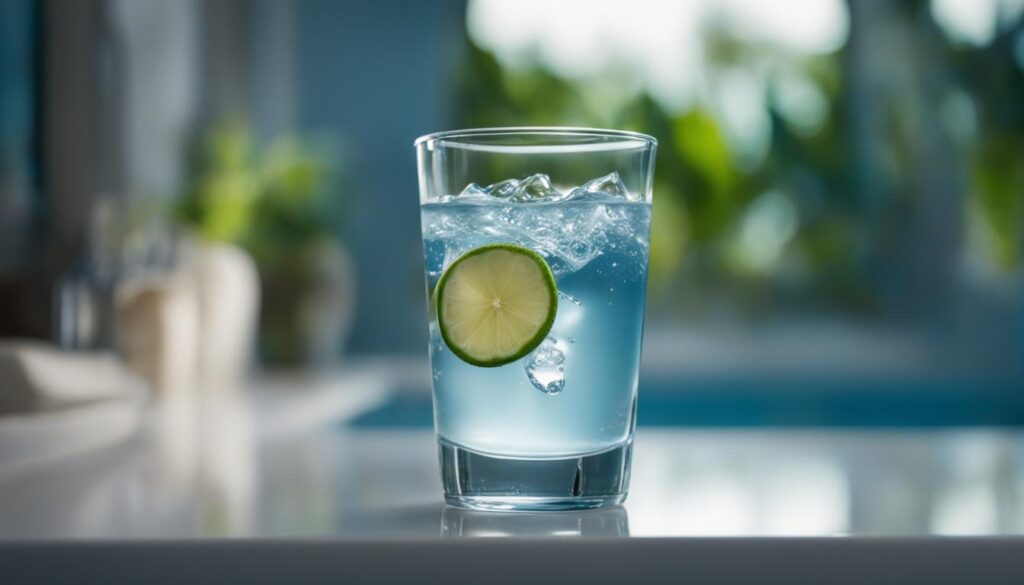
Tap Water Safety in Punta Cana Hotels
When staying at Punta Cana hotels, it’s important to consider the safety of tap water. The quality of tap water can vary depending on the hotel’s water treatment and filtration systems. Some hotels may have their own water purification processes in place to ensure the safety and cleanliness of their tap water, while others may rely on providing bottled water to their guests as a precautionary measure.
It is recommended to inquire with the hotel about their water source, treatment methods, and any additional precautions they take to ensure the safety of their tap water. Asking specific questions such as whether the tap water goes through a purification process, if they use filtration systems, or if they conduct regular water quality testing can provide valuable insights into the hotel’s commitment to providing clean and safe tap water.
If you are unsure about the safety of the tap water in your hotel, it is advisable to use bottled water for drinking and brushing your teeth. Bottled water is widely available in Punta Cana and can provide peace of mind when it comes to water consumption.
Alternatively, you can also consider treating tap water before consuming it. Boiling tap water for at least one minute can help kill harmful bacteria and pathogens. Additionally, using water filtration systems or purification tablets can further ensure the safety of tap water.
Staying hydrated is essential, especially in a tropical climate like Punta Cana, but it’s equally important to prioritize your health and safety by choosing the best water source for consumption during your stay at Punta Cana hotels.
Tap Water Safety in Punta Cana Hotels
| Hotel | Water Source | Treatment Methods | Precautions |
|---|---|---|---|
| Hotel A | Local Water Supply | On-site Water Purification | Regular Water Testing |
| Hotel B | Bottled Water | N/A | Providing Bottled Water for Guests |
| Hotel C | Local Water Supply | Water Filtration System | Regular Maintenance and Cleaning |
It’s important to note that the information provided in the table above is for illustrative purposes only and may not reflect the actual practices of specific hotels in Punta Cana. It is always recommended to inquire directly with the hotel regarding their tap water safety measures.
Tips for Safe Tap Water Consumption in Punta Cana
To ensure a safe tap water consumption experience in Punta Cana, follow these essential tips:
1. Use Bottled Water for Drinking, Brushing Teeth, and Cooking
Whenever possible, opt for bottled water as a reliable and safer alternative for drinking, tooth brushing, and cooking. Bottled water undergoes purification processes to ensure its safety.
2. Treat Tap Water through Boiling or Filtration
If using tap water, consider treating it to minimize potential risks. Boiling tap water for at least one minute can kill disease-causing organisms, while filtration systems can help remove parasites. Follow the manufacturer’s instructions for proper use of filtration systems.
3. Be Cautious with Ice Cubes and Drinks
Avoid consuming ice cubes or drinks made with tap water unless you are confident in its safety. When uncertain, it is best to use bottled water or treated tap water as a precautionary measure.
4. Wash Fruits and Vegetables with Bottled Water or Treated Tap Water
When rinsing fruits and vegetables, use bottled water or tap water that has been properly treated to minimize the risk of contamination. This practice ensures that the produce is safe to consume.
Note: Following these tips can help minimize the risk of waterborne illnesses when consuming tap water in Punta Cana. It is important to prioritize your health and well-being during your stay.
For further assistance or to request a free appointment, visit our website at jjstudiophoto.com or contact us at +1 849 387 9900.
Considerations for Certain Populations
Certain populations, such as young children, pregnant women, older adults, and individuals with weakened immune systems, may be more susceptible to waterborne illnesses. It is important for these individuals to take extra precautions when consuming tap water in Punta Cana. They should consider using bottled water or treating tap water through boiling or filtration methods to ensure its safety. Consulting with a healthcare professional can also provide further guidance on tap water consumption for these populations.
| Population | Tap Water Safety Tips |
|---|---|
| Young Children |
|
| Pregnant Women |
|
| Older Adults |
|
| Individuals with Weakened Immune Systems |
|
For these populations, taking these safety measures can help minimize the risk of waterborne illnesses and promote good health during their visit to Punta Cana. Reaching out to a healthcare professional will provide tailored advice and further ensure the safety of tap water consumption.
Importance of Knowing the Source of Tap Water
When you consume tap water in Punta Cana, it is crucial to know its source. Tap water can sometimes appear clean, even when it is contaminated with bacteria, viruses, and parasites. Therefore, it is essential to verify its safety by understanding where the tap water comes from, whether it has undergone treatment, and the potential risks associated with its consumption. Knowing these details allows you to make informed decisions about whether or not to drink the tap water.
In addition to tap water, bottled water can be a convenient alternative. However, it is equally important to know the source and treatment process of bottled water, especially when traveling to remote locations in Punta Cana. Understanding the origin of bottled water ensures that you are consuming water from a trusted and reliable source.
Importance of Source Verification
«Knowing the source of tap water is crucial to ensure its safety. Clean-looking water can still contain harmful contaminants, so it’s essential to be informed and make wise choices.»
By knowing the source of tap water, you can make informed decisions about its safety based on the level of trust you have in the water source and the treatment processes it undergoes. This knowledge allows you to weigh the potential risks and benefits of consuming tap water in Punta Cana.
Furthermore, understanding the source of tap water can help you identify any specific local factors that may affect water quality. Different regions may have varying levels of water treatment infrastructure and water source quality. Being educated about the local water sources provides valuable insight into potential risks and helps you take necessary precautions to protect your health.
Prioritizing Safety for Your Health
Your health and well-being should be the top priority when it comes to tap water consumption in Punta Cana. By understanding the source of tap water, you can make informed choices that align with your personal risk tolerance and safety preferences. When in doubt, it is advisable to choose the safest option available, such as relying on trusted bottled water or treating tap water using purification methods like boiling or filtration.
Remember, the importance of knowing the source of tap water extends beyond Punta Cana. Whether you’re traveling to other destinations or staying in your hometown, being aware of the water source and treatment processes can help ensure the safety of your drinking water.
To learn more about tap water safety in Punta Cana and to schedule a free appointment, visit our website at jjstudiophoto.com or call us at âï¸ +1 849 387 9900.
Disinfecting Tap Water in Punta Cana
In Punta Cana, if tap water is not safe for consumption or if you prefer to take extra precautions, there are several methods available to disinfect it. By using these methods correctly, you can ensure the safety of tap water.
Boiling Tap Water
Boiling tap water for at least one minute is a tried and tested method to kill disease-causing organisms. This process effectively eliminates harmful bacteria, viruses, and parasites that may be present in the water. Remember to let the water cool before consuming or using it.
Chemical Disinfection
Unscented household chlorine bleach can be used as a chemical disinfectant. By adding a specific amount of bleach to the water, you can eliminate harmful pathogens. It is important to follow the manufacturer’s instructions and ensure that the bleach used is suitable for disinfection purposes.
Water Filtration
Using a water filtration system can offer an additional purification option. Filtration systems are designed to remove impurities and contaminants from tap water, including bacteria and parasites. Make sure to choose a filtration system that is effective against the specific contaminants found in Punta Cana’s tap water.
UV Light Purification
UV light can also be used to disinfect tap water. This method utilizes UV rays to kill bacteria, viruses, and other harmful microorganisms. UV light purification devices are portable and easy to use. It is essential to carefully follow the manufacturer’s instructions for optimal results.
Remember, the effectiveness of these methods may vary depending on the specific contaminants present in the tap water. It is advisable to choose the most suitable method based on your needs and the quality of the tap water in Punta Cana.
If you’re unsure about the safety of tap water or need further assistance with disinfecting tap water in Punta Cana, visit our website jjstudiophoto.com, and request a free appointment with our experts at âï¸ã+1 849 387 9900ã.
Benefits and Limitations of Tap Water Treatment Methods
Different tap water treatment methods in Punta Cana offer distinct advantages and have their own limitations. Understanding these benefits and limitations can help you choose the most suitable tap water treatment option for your needs.
Boiling Water
Boiling water is a reliable and effective method for purifying tap water in Punta Cana. It kills disease-causing organisms, including bacteria and viruses, making the water safe to consume. However, this method requires a heat source and time, making it less convenient for immediate use.
Chemical Disinfectants
Chemical disinfectants such as unscented household chlorine bleach can effectively kill many harmful viruses and bacteria. They are easy to use and readily available. However, some chemical disinfectants may not be as effective against certain parasites, so it’s important to understand their limitations.
Filtration Systems
Filtration systems can remove parasites, improving the safety of tap water in Punta Cana. They are generally effective in removing impurities and improving water quality. However, filtration systems may not eliminate all bacteria or viruses entirely, so it’s essential to consider their limitations and maintenance requirements.
UV Light Treatment
UV light can be used to kill some pathogens in tap water. It is a chemical-free method and does not alter the taste or odor of the water. However, UV light may be less effective in cloudy water, and it may not eliminate all types of contaminants, including certain bacteria and viruses. Understanding the limitations of UV light treatment is crucial when considering this method.
Each tap water treatment method in Punta Cana has its own unique benefits and limitations. By weighing these factors against your specific needs and preferences, you can make an informed decision on the most suitable method to ensure the purification of tap water.
Hygiene Practices for Safe Tap Water Usage
In addition to treating tap water for consumption, practicing good hygiene is essential for safe tap water usage. By following proper hygiene practices, you can reduce the risk of waterborne illnesses. Here are some key tips:
- Wash your hands: Always wash your hands with soap and water before handling food, eating, or using the toilet. This is crucial in preventing the spread of germs and contamination.
- Use hand sanitizer: In situations where soap and water are not readily available, use a hand sanitizer with at least 60% alcohol. This can be a convenient alternative to keep your hands clean and minimize the risk of infection.
- Proper waste disposal: Dispose of human waste properly, especially in remote areas. Improper waste disposal can contaminate water sources, leading to the spread of diseases. Follow local guidelines and use designated facilities for waste disposal.
Practicing good hygiene complements the treatment of tap water and helps ensure your overall safety. By incorporating these habits into your routine, you can enjoy a healthier and safer experience when using tap water in Punta Cana.
Traveling Tips for Tap Water Consumption in Punta Cana
When traveling to Punta Cana, it’s important to be prepared for tap water consumption. Researching the water quality and understanding the available treatment methods can help make informed decisions. Consider carrying water purification devices, such as portable filters or disinfection tablets, to ensure access to safe drinking water. It is also advisable to purchase bottled water from reputable sources. Staying hydrated and practicing safe tap water consumption habits can help prevent waterborne illnesses during your trip.
Tap Water Traveling Tips:
- Research the water quality in Punta Cana to determine the level of safety.
- Understand the available treatment methods for tap water and consider carrying water purification devices.
- Purchase bottled water from reputable sources to guarantee safe consumption.
- Stay hydrated by drinking plenty of water throughout your trip.
Stay informed and take necessary precautions to ensure the safety of tap water while traveling in Punta Cana. By following these tips, you can enjoy your trip without worrying about waterborne illnesses.
Contact us for more information or visit our website to request a free appointment.
Request a Free Appointment âï¸ã+1 849 387 9900ã.
Personal Experiences with Tap Water in Punta Cana
When it comes to tap water in Punta Cana, personal experiences can vary. Some individuals may have consumed tap water without any issues, while others may have encountered waterborne illnesses. It’s important to remember that everyone’s tolerance to tap water differs, and personal preferences play a significant role in this decision.
If you’re considering drinking tap water in Punta Cana, it’s crucial to take necessary precautions to minimize the risk of falling ill. Using bottled water can provide an extra level of safety and peace of mind. Alternatively, treating tap water through boiling or filtration methods can help eliminate potential contaminants.
One valuable approach in making an informed decision is to share personal experiences and advice with fellow travelers. Engaging in conversations and discussing the topic can provide valuable insights and help you gauge different perspectives.
«During my stay in Punta Cana, I opted to drink tap water with no adverse effects. However, I must note that I followed the safety tips provided by locals, such as using a reliable water filter. In my experience, it’s essential to prioritize safety and choose the option that aligns with your comfort level.»
At the end of the day, it’s crucial to prioritize your health and well-being when deciding whether to consume tap water in Punta Cana. By taking necessary precautions and being mindful of personal experiences and advice, you can make an informed decision that suits your needs and preferences.
Local Recommendations and Insights on Tap Water in Punta Cana
When it comes to tap water in Punta Cana, local recommendations and insights can be invaluable for travelers seeking information on water quality. Locals who are familiar with the area can offer guidance and advice on tap water consumption, sharing their experiences and knowledge of the local water sources and treatment processes.
âAs a local resident, I highly recommend seeking out reliable local sources for up-to-date information on tap water quality in Punta Cana,â says Juan Garcia, a long-time resident of Punta Cana. âLocal communities often have a deep understanding of the water sources and potential risks associated with tap water consumption.â
By consulting trusted residents or established local resources, travelers can gain insights on specific areas or establishments where tap water may be safer or more reliable. Local insiders often have firsthand knowledge of places that prioritize water quality and employ advanced treatment methods.
âSome hotels and restaurants in Punta Cana have taken extra steps to ensure their tap water is safe for consumption,â shares Maria Sanchez, a local tour guide. âThey invest in state-of-the-art filtration systems or rely on reputable bottled water suppliers to provide guests with peace of mind.â
Seeking recommendations from locals is especially useful for those who want to explore off-the-beaten-path locations or unique dining experiences in Punta Cana. By accessing local insights, travelers can make more informed decisions regarding tap water consumption based on reliable information in real-time.
| Pros | Cons | |
|---|---|---|
| Local Guidance |
|
|
| Exploring Unique Locations |
|
|
Conclusion
The safety and quality of tap water in Punta Cana can vary depending on the area. While some places may have safe tap water, others may pose a higher risk of contamination. It is crucial for travelers to take precautions and be aware of the source and treatment of tap water to ensure their safety.
Using bottled water for drinking or treating tap water through methods such as boiling or filtration can help minimize the risk of waterborne illnesses. Additionally, consulting local recommendations and staying informed about water quality can provide valuable insights for tap water consumption in Punta Cana.
At JJ Studio, your safety and well-being are our top priorities. We recommend visiting our website jjstudiophoto.com to request a free appointment and learn more about our services. If you have any questions or concerns, please feel free to contact us at âï¸ã+1 849 387 9900ã. We are here to assist you and ensure you have a safe and enjoyable trip to Punta Cana.
FAQ
Is tap water in Punta Cana safe to drink?
The water quality in Punta Cana can vary. While some areas may have safe tap water, others may have a higher risk of contamination. It is recommended to follow tap water safety tips and use bottled water for drinking and brushing teeth whenever possible.
What are some tap water safety tips for Punta Cana?
To ensure safe tap water consumption in Punta Cana, it is important to use bottled water for drinking and cooking whenever possible. If tap water must be used, it is recommended to treat it through boiling or filtration methods. It is also advisable to avoid consuming ice cubes or drinks made with tap water unless you are confident in its safety.
Is it better to drink tap water or bottled water in Punta Cana?
The safest option is usually to choose bottled water in Punta Cana. Bottled water undergoes a purification process and is generally considered safe to drink. However, if you prefer to access tap water, it is recommended to use purification methods like boiling or filtration to ensure its safety.
What are the water treatment methods available in Punta Cana?
In Punta Cana, water can be treated through boiling, disinfection using chemical disinfectants like chlorine bleach, filtration systems, reverse osmosis filters, and UV light. Each method has its own benefits and limitations, so it is important to understand the treatment options and follow the manufacturer’s instructions.
Is tap water in Punta Cana hotels safe to drink?
Tap water safety in Punta Cana hotels can vary depending on the individual hotel’s water treatment and filtration systems. Some hotels may have their own water purification processes, while others may rely on bottled water for their guests. It is recommended to inquire with the hotel about their water source, treatment methods, and any additional precautions they take to ensure the safety of their tap water.
How can I ensure safe tap water consumption in Punta Cana?
To ensure safe tap water consumption in Punta Cana, it is important to use bottled water for drinking, brushing teeth, and cooking whenever possible. If using tap water, consider treating it through boiling or filtration methods. It is also advisable to wash fruits and vegetables with bottled water or properly treated tap water.
Are certain populations more susceptible to waterborne illnesses from tap water in Punta Cana?
Yes, certain populations such as young children, pregnant women, older adults, and individuals with weakened immune systems may be more susceptible to waterborne illnesses. It is important for these individuals to take extra precautions when consuming tap water in Punta Cana, such as using bottled water or treating tap water through boiling or filtration methods.
Why is it important to know the source of tap water in Punta Cana?
It is crucial to know the source of tap water in Punta Cana to understand its potential risks. Water contaminated with bacteria, viruses, and parasites can sometimes appear clean, making it necessary to verify its safety. Understanding where the tap water comes from and if it has been treated can help make informed decisions about its consumption.
How can tap water in Punta Cana be disinfected?
Tap water in Punta Cana can be disinfected through boiling for at least one minute or using chemical disinfectants like unscented household chlorine bleach. Filtration systems and UV light can also be used for purification purposes. It is important to follow the instructions provided by the manufacturers for effective disinfection.
What are the benefits and limitations of tap water treatment methods in Punta Cana?
Each tap water treatment method in Punta Cana has its own benefits and limitations. Boiling water is a reliable method to kill disease-causing organisms, but it requires a heat source and time. Chemical disinfectants can kill viruses and bacteria, but some may not be effective against certain parasites. Filtration systems can remove parasites, but may not eliminate bacteria or viruses completely. UV light can kill some pathogens, but its effectiveness can be impacted by cloudy water.
What hygiene practices are important for safe tap water usage in Punta Cana?
It is essential to wash hands with soap and water before handling food, eating, or using the toilet. In situations where soap and water are not readily available, using a hand sanitizer with at least 60% alcohol can be an alternative. It is also important to dispose of human waste properly to prevent contamination of water sources.
What traveling tips should I follow for tap water consumption in Punta Cana?
When traveling to Punta Cana, it is important to research the water quality, understand the available treatment methods, and consider carrying water purification devices like portable filters or disinfection tablets. It is also advisable to purchase bottled water from reputable sources and practice safe tap water consumption habits to prevent waterborne illnesses.
Are personal experiences with tap water in Punta Cana reliable?
Personal experiences with tap water in Punta Cana may vary. Some individuals may have consumed tap water without any issues, while others may have experienced waterborne illnesses. It is important to consider individual tolerance and preferences when deciding whether to consume tap water. Sharing personal experiences and advice with fellow travelers can also be helpful in making informed decisions.
Can locals provide recommendations and insights on tap water in Punta Cana?
Yes, locals who are familiar with the water quality and treatment processes can offer valuable recommendations and insights on tap water in Punta Cana. Seeking out reliable local sources or consulting with trusted residents can provide up-to-date information on tap water safety and quality in specific areas or establishments.


